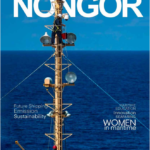Though there is high demand for merchant mariners in the world market, Bangladesh has not been able to take advantage of this opportunity. Not only that, job markets for Bangladeshi seafarers are now shrinking.
Industry insiders said Bangladesh is losing out on the lucrative global job market onboard ship, mainly because of visa problems. Among Asian counties, The Philippines are having larges share of the job market. Also, neighbouring countries, such as India and Myanmar, are expanding their shares of the market. The merchant marine industry comprises the fleets of merchant ships, operated by either the government or the private sector, which mainly transport cargo. Mariners who work in merchant ships are said to be merchant mariners or seafarers. They are classified into two categories: officers and ratings (non-officers).
Merchant fleets can be important economic assets for nations with limited natural resources or small industrial bases by facilitating the international commerce and trade. A merchant fleet contributes to its home nation’s foreign exchange earnings, promotes trade and provides employment.
Capt. Zillur Rahman Bhuiyan, president of the Bangladesh Merchant Marine Officers’ Association (BMMOA) and deputy commandant of the United Maritime Academy, said: “Being a populous country, Bangladesh has probably the highest potential after The Philippines to provide trained young mariners to meet the shortage of marine officers around the world. The country can thereby earn a large sum of foreign exchange.”
The Philippines has the highest number of merchant mariners in the world. The country has a total population of 10 crore (100 million) and, of this, nearly one crore (95 lakh) are overseas employees. Among the overseas employees, the country has five lakh seafarers. “The reason why I am saying this is that though the number of seafarers is five per cent of the total overseas workers of The Philippines, the seafarers earn 31 per cent of the total remittances of the country. It is only possible because merchant mariners get higher salaries,” explained Capt. Bhuiyan.
Capt. Bhuiyan said we talk a lot about the inflow of remittances into our country, but we never focus on the contributions of merchant mariners.
Seafaring is the world’s first globalised industry. Our neighbouring countries have taken advantage of the industry. There are 80,000 overseas seafarers in Myanmar. India has some 110,000 mariners. On the other hand, the number of Bangladeshi seafarers is very low. According to Bangladesh’s Department of Shipping (DoS), the country has a total of 3,724 ratings and 8,064 registrar officers.
Apart from merchant shipping, Bangladesh’s mariners are performing many shore-based jobs in different countries, including Singapore, Australia and UK. Bangladeshi origin merchant mariners are enjoying high positions in the maritime administrations in Australia and UK.
Capt. Bhuiyan said: “Once lots of jobs were available to the Bangladeshi merchant mariner onboard ships. Recently, the job markets for Bangladeshi seafarers are shrinking, mainly because of visa restrictions imposed by various countries, such as Singapore and the United Arab Emirates (UAE), which are shipping
hubs. Joining/signing off on the part of Bangladeshi seafarers has become difficult as a result of the visa problems.”
“If we can solve the visa problems, mainly because of which we are losing our global job markets, the mariners can contribute a lot to our gross domestic product (GDP),” Capt. Bhuiyan added.
Echoing Bhuiyan, Capt. Mohamed Gaish Uddin Ahmed, nautical server and examiner in Bangladesh’s DoS, said the visa problem was the main reason why Bangladesh was losing its job markets abroad. “We are trying to solve the problem,” he added.
Capt. Ahmed, who earlier worked in Tokay Marine Japan, said the wages of seafarers is much higher compared to those of other professions. The lowest salary of a rating is around USD 500 per month in government ships and USD 800 in foreign ships, while a captain earns around USD 14,000 a month. “Another reason why we are losing out on jobs in global shipping companies is because we are weak in the English language. If we compare Bangladeshi seafarers with Filipino seafarers, we are better than them in all respects, except in English. Shipping companies show reluctance to recruit Bangladeshi seafarers as they cannot communicate in English,” said Capt. Bhuiyan.
Fake documentation and instances of mariners fleeing their ships are other issues faced by stakeholders in this industry.
“Our mariners, mainly ratings, flee the ships when they arrive in the ports of developed countries,” Capt. Bhuiyan said. He added, “If any crew member deserts a ship, the ship-owner has to pay a fine for this to the local authorities. The ratio of deserter is higher in the case of Bangladeshi mariners among Asian; this tarnishes the image of Bangladeshi seafarers.”
Capt. Bhuiyan said, “Another big challenge facing the private marine academies is arranging a year’s on board training for appearing in their first certificate of competency, as the number of government ships has declined remarkably.”
DoS official said Bangladesh had 80 merchant ships in 2012, but the number of ships declined to 37 in 2014, as most of the ships were outdated. As such, onboard training of cadets is becoming difficult.
Capt. Bhuiyan said: “All stakeholders of the maritime industry must act with concerted efforts to eliminate the problems and ensure the reputation of Bangladeshi seafarers.”
According to the Shipping Office, Chittagong, some 555 students qualified from 18 marine academies including government-run one as of June, 2014. In 2013, the number was 267.
Capt. Ahmed said it was a very prosperous sector for young people.” If we can solve the problems facing the sector and provide quality seafarers to international shipping, they will be more than happy to have them in their fleet.”
“We need an efficient regulatory body and overseas employment opportunities for this sector to flourish,” said Capt. Bhuiyan, adding: “If we can ensure that this sector flourishes, it will be a lucrative source of employment for our young people. The maritime industry, too, will contribute significantly to our GDP.”
Published in the daily The Independent on 23 NOV 2014 | Author / Source: KANIZ FATIMA
http://www.theindependentbd.com/index.php?option=com_content&view=article&id=238168:lucrative-yet-overlooked-career&catid=110:business-others&Itemid=156
———————–

















Leave a comment